北师大版 英语课件:八年级下unit 12 western china
文档属性
| 名称 | 北师大版 英语课件:八年级下unit 12 western china |
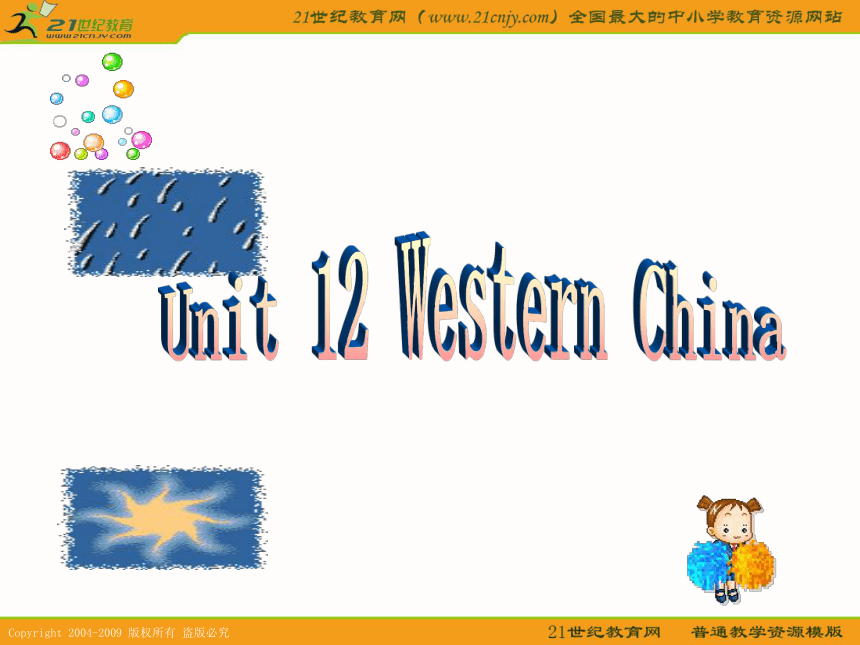
|
|
| 格式 | rar | ||
| 文件大小 | 164.5KB | ||
| 资源类型 | 教案 | ||
| 版本资源 | 北师大版 | ||
| 科目 | 英语 | ||
| 更新时间 | 2010-08-19 00:00:00 | ||
图片预览

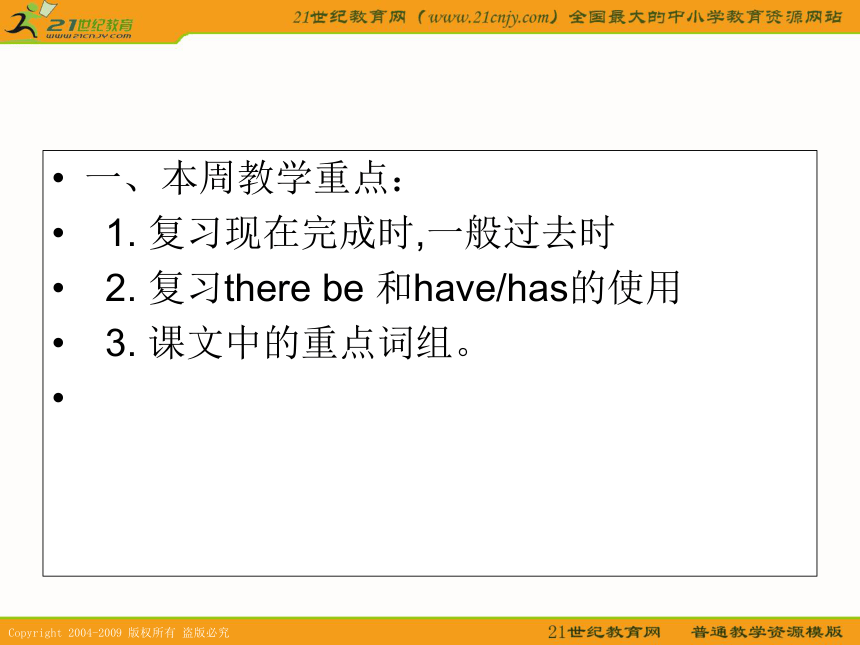
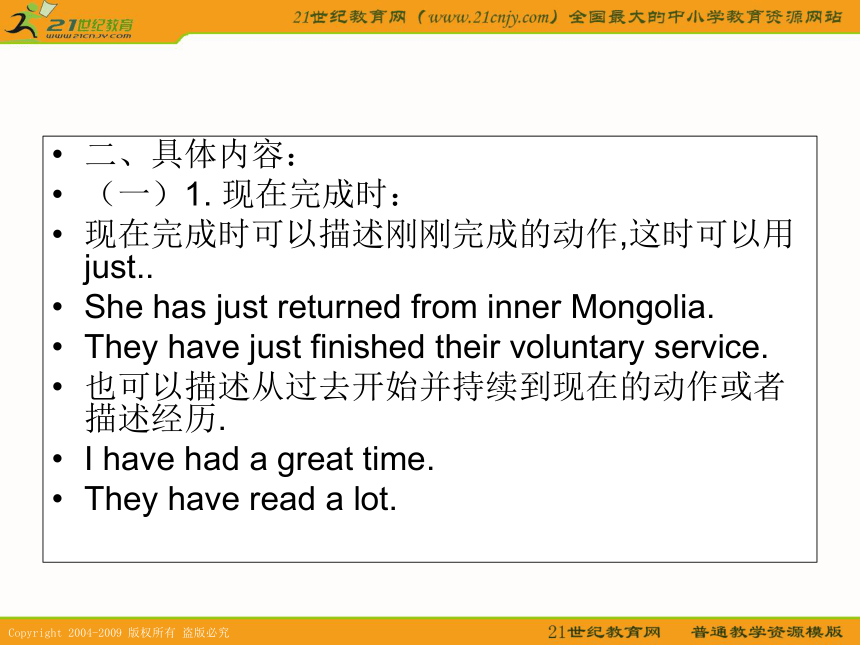
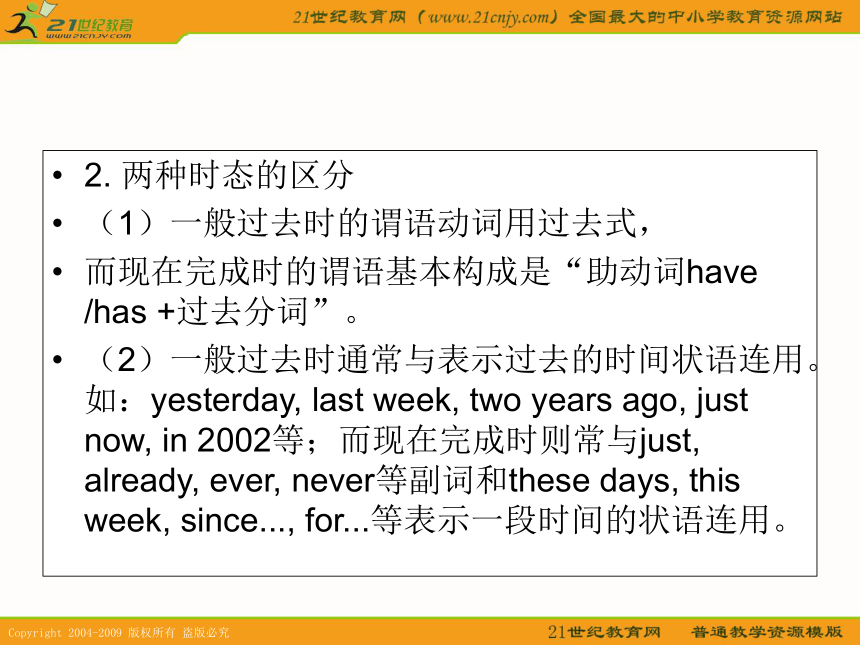
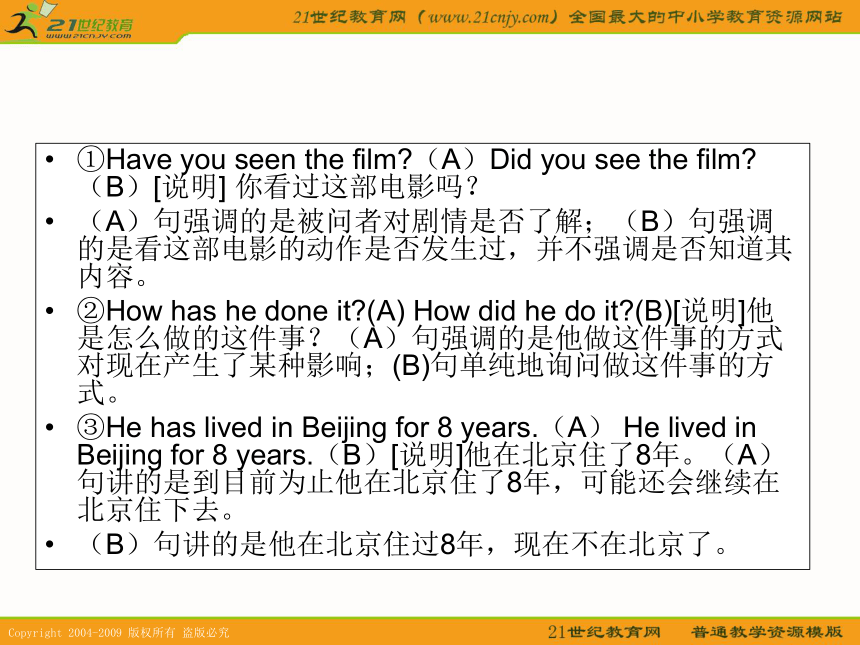
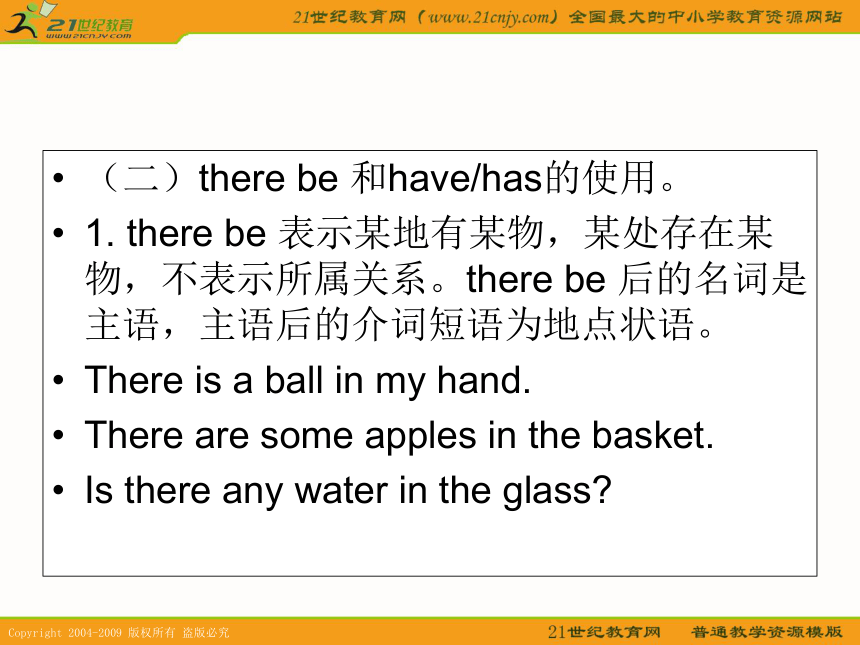

文档简介
课件15张PPT。Unit 12 Western China一、本周教学重点:
? 1. 复习现在完成时,一般过去时
? 2. 复习there be 和have/has的使用
? 3. 课文中的重点词组。
?二、具体内容:
(一)1. 现在完成时:
现在完成时可以描述刚刚完成的动作,这时可以用just..
She has just returned from inner Mongolia.
They have just finished their voluntary service.
也可以描述从过去开始并持续到现在的动作或者描述经历.
I have had a great time.
They have read a lot.2. 两种时态的区分
(1)一般过去时的谓语动词用过去式,
而现在完成时的谓语基本构成是“助动词have /has +过去分词”。
(2)一般过去时通常与表示过去的时间状语连用。如:yesterday, last week, two years ago, just now, in 2002等;而现在完成时则常与just, already, ever, never等副词和these days, this week, since..., for...等表示一段时间的状语连用。①Have you seen the film?(A)Did you see the film?(B)[说明] 你看过这部电影吗?
(A)句强调的是被问者对剧情是否了解;(B)句强调的是看这部电影的动作是否发生过,并不强调是否知道其内容。
②How has he done it?(A) How did he do it?(B)[说明]他是怎么做的这件事?(A)句强调的是他做这件事的方式对现在产生了某种影响;(B)句单纯地询问做这件事的方式。
③He has lived in Beijing for 8 years.(A) He lived in Beijing for 8 years.(B)[说明]他在北京住了8年。(A)句讲的是到目前为止他在北京住了8年,可能还会继续在北京住下去。
(B)句讲的是他在北京住过8年,现在不在北京了。(二)there be 和have/has的使用。
1. there be 表示某地有某物,某处存在某物,不表示所属关系。there be 后的名词是主语,主语后的介词短语为地点状语。
There is a ball in my hand.
There are some apples in the basket.
Is there any water in the glass?2. have/has 是拥有,占有的意思。它表示一种所属关系。
I have a pen in my hand.
I don’t have any car.
Do you have any computer?
3. 表示单位的组成,构成时,have 和there be 可互换。
A week has seven days./ There are seven days in a week.
A year has four seasons./ There are four seasons in a year.(三)重点词组:
1. in the west/east/south/north
The sun rises in the east and sets in the west.
Beijing is in the north of China.
2. be rich in
Oranges are rich in vitamin C.
The northeast part of China is rich in rice.3. plan to do
The school has planned to hold a sport meeting in spring.
4. at the end of…
The speaker said “Goodbye” to the audience at the end of the meeting.
5. dream of
My friend is dreaming of being a spaceman when he grows up.
Jim dreams of becoming a film star one day.6. spend… doing…
Many students usually spend 3 or 4 hours doing their homework every night.
Wang Peng spends his spare time collecting stamps.
7. begin to do sth.
Many children began to learn English at the age of six.
8. find out
How did he find out?
We must try to find out when the train leaves.9. over half
We went over half of the distance on foot.
10. at first
At first I didn’t like him but later I found he was an honest man.
At first he was not interested in the work but later he became used to it.
11. by the way
By the way, this is between us only.
By the way, you may come, too.课堂练习:
I. 用动词的适当形式填空。
1. His father ????(go) to work in Japan in 1990.
??? He ?????(work) there for a long time.
2. Jim ?????(work) a lot of friends since he ?????(study) in our school.
3. He ?????just ????(receive) a letter from Mary. She ????(write) the letter a week ago.
4. She ?????(visit) it last week and she ??????(learn) a lot.5. —??? you ?????(see) pandas?
??? —Yes, I have.
??? —Where ?????you ????(see) them?
??? —I ?????(see) them when I was in Sichuan last year.
6. He can’t play football. He ????(break) his leg when he got off the bike.
7. ???????you ever ????(read) the story about Hong Zhanhui?II. 完成句子:
1. 这个国家有丰富的煤矿。
This country ????????????????????coal.
2. 他梦想去欧洲。
He ?????????????????????Europe.
3. 我们学校在这条街的尽头。
Our school is ????????????????????????the street.
4. 我计划去青岛度假。
I ?????????????????my holiday ?????Qingdao.
5. 在北京的第一天,我去了天安门。
???? ?????????????????????????in Beijing, I went to Tian’anmen Square.That's over!
? 1. 复习现在完成时,一般过去时
? 2. 复习there be 和have/has的使用
? 3. 课文中的重点词组。
?二、具体内容:
(一)1. 现在完成时:
现在完成时可以描述刚刚完成的动作,这时可以用just..
She has just returned from inner Mongolia.
They have just finished their voluntary service.
也可以描述从过去开始并持续到现在的动作或者描述经历.
I have had a great time.
They have read a lot.2. 两种时态的区分
(1)一般过去时的谓语动词用过去式,
而现在完成时的谓语基本构成是“助动词have /has +过去分词”。
(2)一般过去时通常与表示过去的时间状语连用。如:yesterday, last week, two years ago, just now, in 2002等;而现在完成时则常与just, already, ever, never等副词和these days, this week, since..., for...等表示一段时间的状语连用。①Have you seen the film?(A)Did you see the film?(B)[说明] 你看过这部电影吗?
(A)句强调的是被问者对剧情是否了解;(B)句强调的是看这部电影的动作是否发生过,并不强调是否知道其内容。
②How has he done it?(A) How did he do it?(B)[说明]他是怎么做的这件事?(A)句强调的是他做这件事的方式对现在产生了某种影响;(B)句单纯地询问做这件事的方式。
③He has lived in Beijing for 8 years.(A) He lived in Beijing for 8 years.(B)[说明]他在北京住了8年。(A)句讲的是到目前为止他在北京住了8年,可能还会继续在北京住下去。
(B)句讲的是他在北京住过8年,现在不在北京了。(二)there be 和have/has的使用。
1. there be 表示某地有某物,某处存在某物,不表示所属关系。there be 后的名词是主语,主语后的介词短语为地点状语。
There is a ball in my hand.
There are some apples in the basket.
Is there any water in the glass?2. have/has 是拥有,占有的意思。它表示一种所属关系。
I have a pen in my hand.
I don’t have any car.
Do you have any computer?
3. 表示单位的组成,构成时,have 和there be 可互换。
A week has seven days./ There are seven days in a week.
A year has four seasons./ There are four seasons in a year.(三)重点词组:
1. in the west/east/south/north
The sun rises in the east and sets in the west.
Beijing is in the north of China.
2. be rich in
Oranges are rich in vitamin C.
The northeast part of China is rich in rice.3. plan to do
The school has planned to hold a sport meeting in spring.
4. at the end of…
The speaker said “Goodbye” to the audience at the end of the meeting.
5. dream of
My friend is dreaming of being a spaceman when he grows up.
Jim dreams of becoming a film star one day.6. spend… doing…
Many students usually spend 3 or 4 hours doing their homework every night.
Wang Peng spends his spare time collecting stamps.
7. begin to do sth.
Many children began to learn English at the age of six.
8. find out
How did he find out?
We must try to find out when the train leaves.9. over half
We went over half of the distance on foot.
10. at first
At first I didn’t like him but later I found he was an honest man.
At first he was not interested in the work but later he became used to it.
11. by the way
By the way, this is between us only.
By the way, you may come, too.课堂练习:
I. 用动词的适当形式填空。
1. His father ????(go) to work in Japan in 1990.
??? He ?????(work) there for a long time.
2. Jim ?????(work) a lot of friends since he ?????(study) in our school.
3. He ?????just ????(receive) a letter from Mary. She ????(write) the letter a week ago.
4. She ?????(visit) it last week and she ??????(learn) a lot.5. —??? you ?????(see) pandas?
??? —Yes, I have.
??? —Where ?????you ????(see) them?
??? —I ?????(see) them when I was in Sichuan last year.
6. He can’t play football. He ????(break) his leg when he got off the bike.
7. ???????you ever ????(read) the story about Hong Zhanhui?II. 完成句子:
1. 这个国家有丰富的煤矿。
This country ????????????????????coal.
2. 他梦想去欧洲。
He ?????????????????????Europe.
3. 我们学校在这条街的尽头。
Our school is ????????????????????????the street.
4. 我计划去青岛度假。
I ?????????????????my holiday ?????Qingdao.
5. 在北京的第一天,我去了天安门。
???? ?????????????????????????in Beijing, I went to Tian’anmen Square.That's over!
同课章节目录
- Unit 1 Technology and the Future
- Lesson 1 Schools of the Future
- Lesson 2 Online Life
- Lesson 3 Tomorrow's Jobs
- Communication Workshop
- Unit 2 Communication
- Lesson 4 Animal Talk
- Lesson 5 Meeting People
- Lesson 6 The Texting Generation
- Communication Workshop
- Unit 3 Festivals and Holidays
- Lesson 7 Chinese New Year
- Lesson 8 A Picnic
- Lesson 9 Thanksgiving
- Communication Workshop
- Unit 4 Dealing with Problems
- Lesson 10 Problem Page
- Lesson 11 Online Time
- Lesson 12 Generation Gap
- Communication Workshop
- Unit 5 Memories
- Lesson 13 A Daughter's Letter
- Lesson 14 Grandpa's Memories
- Lesson 15 Life in the 1950s
- Communication Workshop
- Unit 6 Detectives
- Lesson 16 A Detective Story (I)
- Lesson 17 A Detective Story (II)
- Lesson 18 The Mystery Writer
- Communication Workshop
